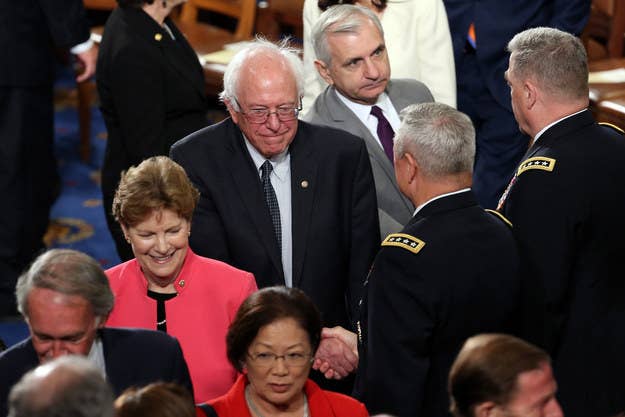At stops in Iowa this weekend, Sanders was asked by voters for his take on why Washington isn't working. In Des Moines on Saturday, a voter asked if he supported "filibuster reform" in the Senate.

"The question is, 'do I support filibuster reform, regardless of which party has control'? The answer is, 'yes I do,'" Sanders said.
"The Senate right now, for a wide variety of reasons, is fairly dysfunctional. And we need to create a body that can move with some speed to address the major issues facing our country," he said. "And the idea that one person can put a hold on a nominee is really not acceptable in the year 2015."
Sanders has long called for an end to the Senate practice of requiring 60 votes to allow most legislation to proceed through the chamber, though he doesn't talk much about filibuster reform in his standard presidential stump speech. In 2013, Sanders' Senate office posted a short explanation of how Sanders wants to change the Senate:
Sanders supports a so-called talking filibuster. With the support of 51 senators such a change in Senate procedure would force opponents of a bill to stand up on the Senate floor and explain their reasons, at length if they desired, for opposing a bill. The change would put an end to the current practice of routinely requiring a 60-vote majority to even consider a bill through the exercise of a silent objection.
In 2013, when Democrats led the Senate, they changed the way the filibuster works for many executive nominations, preventing in most cases the kinds of single-senator holds of nominees Sanders railed against in Des Moines. When Republicans took over in 2015, they didn't show any interest in changing the rules back. Those rule changes are not without their risk or criticism: Removing the 60-vote threshold for most nominees results in more presidential nominees receiving confirmation — but, when one party holds the presidency and the Senate majority, a 51-vote threshold allows that party to essentially control most nominations. Regardless, so far, neither party's leaders have embraced the kind of sweeping changes Sanders wants.
In Newton, a voter asked Sanders what he thought about House Speaker John Boehner's surprise resignation from Congress last week.

Sanders' answer: The leadership shakeup in the GOP-controlled House shows the party has completely fractured.
"Boehner is a conservative guy, but he's not crazy," Sanders said. "And now you have, maybe a couple dozen extreme, extreme right wing Republicans who really don't much believe in government. And there's nobody in that group that would ever support anything that Barack Obama would sign. And therefore the Republican Party — if you get rid of these people, 20 or 30 of them, the Republican Party's majority is not big enough to be able to pass anything, and that's what they threatened Boehner with. And he's been having to deal with this for five years."
"Then he has to go to the Democrats to get the votes that he needs and then he's hated even more," Sanders went on. "So I think basically — I know Boehner, I've known him for years — I guess he probably said 'enough is enough, I'm not going to deal with this craziness.' He can go out and make a whole lot more money than he's making and not have to deal with this horrendous pressure that he's under. That would be my guess. But we will see what happens. The problem is not going to go away and the Republican Party will have to decide whether it is an extremely conservative party or, even worse, a right-wing extremist party. That's where they are right now and we'll see how they come out."
On the day Boehner announced his resignation last week, Sanders's Senate office put out a less detailed version of essentially the same take on the House.
"It appears that even a very conservative speaker like John Boehner is unable to control the extreme right-wing drift of Republicans in the House. This is a party whose ideology is way out of touch with the American people. Without Boehner, it may get even worse."
On Sunday in Waukee, Sanders was asked by the moderator at a Jewish Federation of Greater Des Moines event how he'd fix the problems in DC. "Well, John Boehner examined that issue and he quit!" Sanders joked. But he has a plan.
The first idea is his hope that voters will return Congress to Democratic control next year. That's not likely to happen — it's essentially structurally impossible in the House — and Sanders knows it.
Sanders' plan is to pressure lawmakers by pulling people back into the political process who have left it.
"Barack Obama is a personal friend of mine," Sanders said. "The biggest mistake in my view, political mistake that Barack Obama made is after his brilliant campaign in 2008...what he essentially in so many words said, 'thank you for helping elect me president, I will take it from here. I will sit down with John Boehner and Mitch McConnell and we'll negotiate fair agreements.' He was wrong in two ways: The Republicans never had any intention of negotiating any honest compromise, that was never their intention."
"What we have to do is bring together millions of people, often young, often lower income and working class people who have given up on the political process. And when those people come together, yes, we will be able to raise the minimum wage to $15 an hour over the next few years, yes, we will make public colleges and universities tuition-free," Sanders said. "Because if Republicans vote no, they will pay a very, very heavy political price for that. ... The job of a President Sanders will be to make sure that every American knows what's going on, that we are educated, we are organized, and we are effective. When that happens, we change America."
